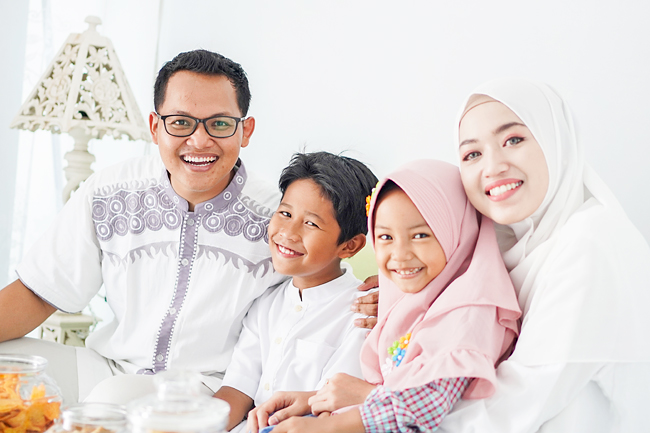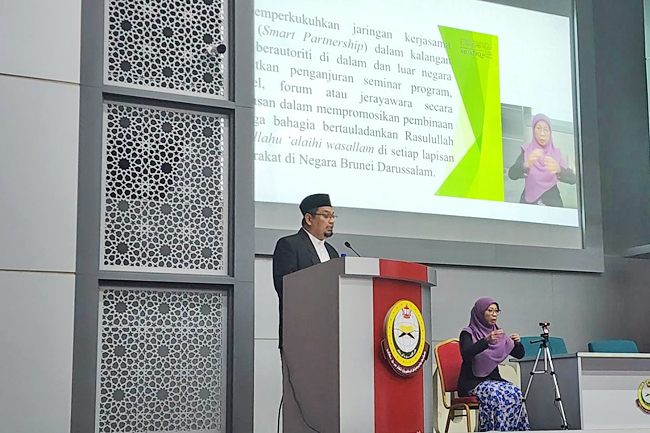Rokiah Mahmud
In the era of globalisation, issues concerning teenagers and youth, particularly social problems, have become increasingly concerning. The family institution plays a significant role in educating and shaping children, making them exemplary individuals for their generation.
This was highlighted during the recent International Mu’tamar on Fiqh Al-Usrah 2023 (MUAFIQ23) organised by Religious Teachers University College of Seri Begawan (KUPU SB).
The seminar emphasised the importance of family institution in shaping the community, as well as the significance of education and religious teaching in guiding lifestyles to keep individuals from being easily influenced.
The role of parents is crucial because when they are able to fulfil their responsibilities effectively, issues concerning children can be addressed or prevented. At the same time, parents should prioritise their children’s well-being and affairs as part of the effort to prevent them from engaging in social ills that could have an impact on their future.
The seminar also called on parents to take action in addressing issues faced by their children, especially teenagers, because when these teenagers are corrupted by negative influence, it could jeopardise the future of a generation.


There are several roles that parents play – educating and guiding their children; enabling them to become just and wise leaders in the future; and shaping exemplary characters in them.
It was also highlighted that having adequate religious education is one of key factors in shaping a child’s character, and that the lack of emphasis by parents on religious upbringing can lead children to be trapped in various social problems, with little ability to differentiate between right and wrong.
In a speech during the opening ceremony of MUAFIQ23, Deputy Permanent Secretary (Policy and Religious) at the Ministry of Religious Affairs (MoRA) Haji Mohd Serudin bin Haji Timbang said Islam has placed great emphasis and importance on family life, establishing rules to preserve the family from destruction and disharmony.
He believes that family is the foundation for building and developing a generation, and that it instils a sense of responsibility among family members and nurtures obedience and love in leading a religious life. In addition, the family is crucial for building a society that is capable in upholding Islamic teachings.
During the seminar, various research papers were presented, addressing topics related to the event’s sub-themes.
A paper delivered by Associate Professor Dr Sharifah Hayaati Syed Ismail from the Department of Siasah Syar’iyyah (Islamic Political Science), Academy of Islamic Studies, University of Malaya on ‘Managing Family and Work Conflicts in the New Era based on Da’wah Approach’ highlighted the impact of COVID-19 in bringing positive and negative effects on global society.
During her presentation, the associate professor stressed the pandemic has impacted economy, health, education, society and family institution. The ability to address family and work conflicts based on a dakwah approach is hoped to provide personal well-being, family happiness, organisational excellence, and a society based on Maqasid Syariah and other Islamic principles.
The two-day seminar aimed to promote Islamic tarbiyyah (upbringing) – following the ways of Prophet Muhammad (pbuh), empowering Islamic family education, identifying challenges, and providing solutions for a harmonious family life. The seminar aspired to have a positive impact on education and formation of Islamic families, particularly within the community of Brunei Darussalam.
It is also hoped that MUAFIQ23 will have a positive impact and provide useful value in the aspects of education and formation of Islamic families, particularly among the communities.
The seminar concluded with 12 resolutions, delivered by Associate Professor Mohd Shahril bin Ahmad Razimi from the Faculty of Social Science Education, KUPU SB, emphasising an empowering the family institution by practising the Sunnah (teachings) of Prophet Muhammad (pbuh) in daily life; nurturing family bonds through Islamic values; and establishing smart partnership networks among local and foreign authoritative parties to promote the model of happy families based on Prophet Muhammad’s (pbuh) teachings.
The importance of Aqidah (faith) and Tauhid education in the family institution was highlighted during the presentation of resolutions, and the need to address family conflicts, emotional instability, personal changes and mental health.
Enhancing cyber security, promoting effective communication based on Islamic principles, prioritising dakwah in resolving conflicts and addressing moral degradation and mental health issues were also among the points included in the resolutions.







